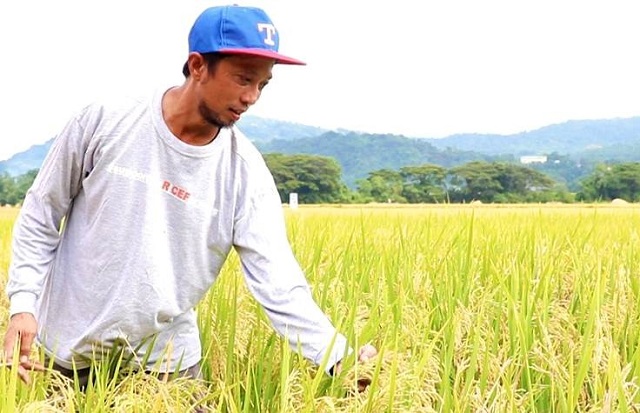
PalaySikatan, a technology demonstration under the Rice Competitiveness Enhancement (RCEF) Fund Seed Program, has helped farmers improve their farm practices by introducing new rice varieties.
Dexter Bacaniwas had been satisfied with NSIC Rc 480, his constant for more than two years.
“I was not interested in shifting to the new varieties I heard from my fellow farmers because Rc 480 is drought-resistant, high-quality, and consistently performs well,” he said.
A PalaySikatan field day near his residence convinced the 38-year-old farmer from San Gabriel, La Union to change his mind after he witnessed the potential of some varieties in the 500 series.
PalaySikatan aims to showcase modern rice varieties and farm machines through farmers’ fields. In San Gabriel, among the featured varieties include NSIC Rc 506, Rc 508, and Rc 512.
The three varieties yield 5.6-6t/ha and have long grains with a soft to medium eating quality
NSIC Rc 506 is moderately resistant to stem borer, blast, sheath blight, brown planthopper (BPH), and green leafhopper (GLH) while NSIC Rc 508 is moderately resistant to blast, bacterial leaf blight (BLB), BPH, and GLH. NSIC Rc 512 is moderately resistant to blast, stem borer, BLB, BPH, and GLH.
“These varieties stood out in the field with abundant grains and proved to be drought-resistant like Rc 480. I voted for them as the top performers when asked to rate them.,” Bacani said.
He was further encouraged to try the new varieties recommended by RCEF after learning about the disadvantages of continuously using the same variety, which was discussed in a field day by Department of Agriculture-Philippine Rice Research Institute (DA-PhilRice) in Batac City, Ilocos Norte.
“I learned that repeatedly planting one variety could attract more insect pests and diseases leading to decreased yield. This learning prompted me to try the new varieties in the PalaySikatan,” he said.
Bacani plans to try one of the said varieties this 2023 cropping season.
The RCEF Seed Program is a component of Republic Act 11203 or Rice Tariffication Law, which allocates P3 billion fund every year for seed requirements of rice farmers to help them produce high-quality rice. LGUs, lawmakers and partners assist in its implementation.




